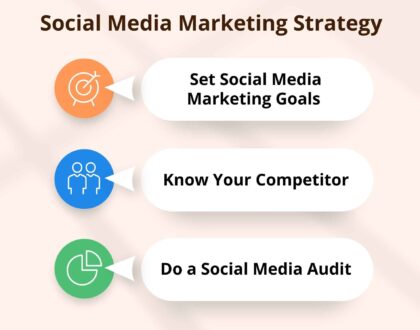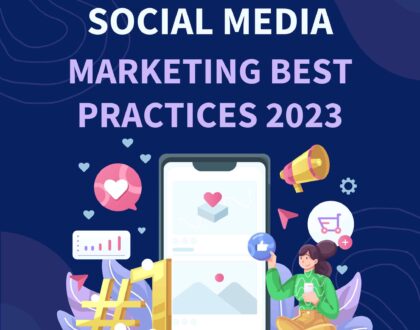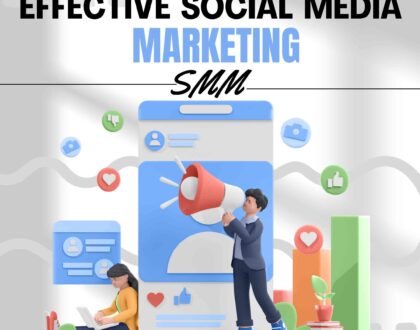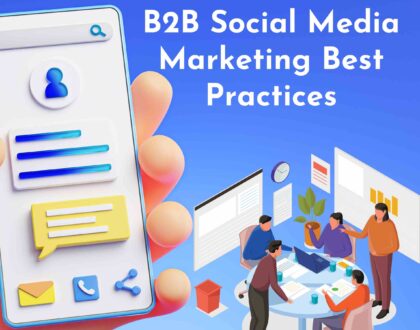Best Social Media Marketing Strategy in 2023. In the dynamic world of digital marketing, staying ahead of the curve is essential. As we dive into 2023, the landscape of social media marketing continues to evolve, presenting both challenges and opportunities for businesses. A well-crafted social media strategy is no longer just a luxury; it’s a necessity for brands aiming to connect with their target audience and drive meaningful engagement. Let’s explore the best social media marketing strategy for 2023 that can help businesses thrive in this ever-changing environment.
1. Data-Driven Insights
The heart of any successful social media strategy lies in understanding your audience. In 2023, businesses need to leverage data-driven insights more than ever before. Utilize advanced analytics tools to gain a deep understanding of your audience’s behavior, preferences, and demographics. By analyzing this data, you can tailor your content to resonate with your audience, ensuring your messages hit the right mark.
2. Video Dominance
Video content continues to reign supreme on social media platforms. The attention span of online users is getting shorter, making snackable, engaging video content a must-have. Live streaming, short-form videos, and interactive content like polls and quizzes can captivate your audience and encourage them to stay connected with your brand.
3. Ephemeral Content
Ephemeral content, which disappears after a set period, has gained immense popularity with the rise of platforms like Instagram Stories and Snapchat. This form of content encourages a fear of missing out (FOMO) and provides a unique opportunity for businesses to showcase behind-the-scenes moments, promotions, and limited-time offers.
4. Social Commerce
The integration of shopping features within social media platforms is a game-changer. In 2023, prioritize social commerce by setting up shops on platforms like Instagram, Facebook, and Pinterest. This seamless shopping experience allows users to make purchases directly from your social media posts, reducing friction in the buyer’s journey.
5. AI and Chatbots
Artificial Intelligence (AI) and chatbots are revolutionizing customer service on social media. Automated chatbots can handle inquiries, provide quick responses, and even guide users through the purchasing process. This enhances user experience and ensures round-the-clock engagement.
6. Personalization at Scale
Personalization goes beyond addressing customers by their first name. In 2023, use the wealth of data available to create highly personalized experiences. Segment your audience based on their interests, behaviors, and buying patterns. Tailor your content to each segment, ensuring … Read the rest
Social media has become an integral part of our lives, and for businesses, it has evolved into a powerful platform for marketing, engagement, and brand building. As we step into 2023, the landscape of social media marketing continues to evolve rapidly. To ensure your brand’s success in this dynamic environment, it’s crucial to stay up-to-date with the latest best practices. In this comprehensive guide, we’ll explore over 50 social media marketing best practices that can help your business thrive in 2023.
1. Setting Clear Goals and Objectives
- Defining Specific, Measurable, Achievable, Relevant, and Time-Bound (SMART) goals.
- Aligning social media goals with overall marketing and business objectives.
2. Understanding Your Target Audience
- Conducting thorough audience research to understand demographics, interests, and behavior.
- Creating detailed buyer personas to tailor content and strategies accordingly.
3. Choosing the Right Platforms
- Focus on platforms that resonate with your target audience.
- Considering platform popularity, features, and engagement levels.
4. Consistent Branding
- Using consistent brand colors, fonts, and imagery across all social profiles.
- Creating a recognizable brand identity that aligns with your business’s values.
5. Optimizing Profiles
- Crafting compelling and keyword-rich bios that clearly communicate your brand’s value.
- Utilizing high-quality profile and cover images that reflect your brand’s essence.
6. Content Strategy and Planning
- Developing a content calendar to maintain consistency and avoid haphazard posting.
- Balancing promotional, educational, entertaining, and engaging content.
7. Visual Appeal
- Incorporating eye-catching visuals, including images, videos, infographics, and GIFs.
- Ensuring all visuals are high-resolution and mobile-friendly.
8. Utilizing Video Content
- Leveraging the growing popularity of video content for storytelling and engagement.
- Creating a mix of live videos, short-form videos, and longer video formats.
9. User-Generated Content (UGC)
- Encouraging customers to share their experiences with your products or services.
- Reposting UGC to build authenticity and trust.
10. Hashtag Strategy
- Researching trending and relevant hashtags to increase discoverability.
- Developing a branded hashtag to encourage user participation.
11. Engagement and Community Building
- Responding promptly to comments, messages, and mentions.
- Hosting Q&A sessions, polls, and interactive content to foster engagement.
12. Influencer Collaborations
- Partnering with influencers who align with your brand’s values and target audience.
- Allowing influencers creative freedom while ensuring alignment with your brand.
13. Social Listening
- Monitoring social media for brand mentions and customer feedback.
- Using social listening tools to gain insights and make informed decisions.
14. Paid Advertising
…
Read the rest In the digital age, social media has transformed from a mere platform for communication and networking into a powerful tool for businesses to engage with their audience, build brand awareness, and drive sales. For small businesses, social media marketing offers a cost-effective way to level the playing field against larger competitors and reach a global audience. However, to reap the benefits of social media marketing, a well-thought-out and strategic approach is essential. In this comprehensive guide, we will delve into the strategies, tips, and best practices that can make social media marketing effective for small businesses.
Table of Contents
1.1 What is Social Media Marketing?
1.2 Why is Social Media Marketing Important for Small Businesses?
2. Choosing the Right Social Media Platforms
2.1 Audience Research and Profiling
2.2 Platform Suitability
2.3 Platform Diversity
3. Creating a Compelling Social Media Strategy
3.1 Setting Clear Goals and Objectives
3.2 Defining Key Performance Indicators (KPIs)
3.3 Content Planning and Creation
3.4 Content Calendar
4. Engagement and Community Building
4.1 Responding Promptly
4.2 Fostering Two-way Communication
4.3 Building a Brand Persona
5. Harnessing the Power of Visuals
5.1 Importance of Visual Content
5.2 High-Quality Imagery and Graphics
5.3 Videos and Live Streaming
6. Effective Content Distribution
6.1 Timing and Consistency
6.2 Hashtags and Keywords
6.3 Collaborations and Partnerships
7. Paid Advertising on Social Media
7.1 Boosting Posts vs. Targeted Ads
7.2 Ad Campaign Budgeting
7.3 Ad Performance Monitoring
8. Monitoring and Analytics
8.1 Utilizing Social Media Insights
8.2 Google Analytics and UTM Parameters
8.3 Adapting Strategies Based on Analytics
9. Adapting to Trends and Algorithm Changes
9.1 Staying Current with Trends
9.2 Understanding Algorithm Changes
9.3 Agility and Flexibility in Strategy
10. Avoiding Common Mistakes
10.1 Inconsistent Branding
10.2 Ignoring Negative Feedback
10.3 Quantity Over Quality
11. Case Studies: Small Business Excelling in Social Media Marketing
11.1 Example 1: Local Artisanal Bakery
11.2 Example 2: Online Handmade Jewelry Store
Conclusion
Social media marketing involves the use of social media platforms to connect, interact, and engage with a target audience with the goal of achieving specific business objectives. These objectives can range from building brand awareness and increasing website traffic to driving sales and customer loyalty.
The core of social media marketing lies in creating and sharing valuable content … Read the rest
In today’s rapidly evolving business landscape, social media has become an integral part of B2B marketing strategies. While B2C (business-to-consumer) social media marketing often steals the spotlight, the significance of B2B social media marketing should not be underestimated. The potential to connect, engage, and build meaningful relationships with other businesses through social platforms is immense. In this comprehensive guide, we will delve into the best practices for B2B social media marketing, equipping you with the insights needed to succeed in the digital realm.
B2B Social Media Marketing Best Practices: Navigating the Digital Landscape
1. Understanding the B2B Social Media Landscape
Before delving into best practices, it’s essential to comprehend the unique characteristics of B2B social media marketing. Unlike B2C marketing, which focuses on targeting individual consumers, B2B marketing targets other businesses. This often involves longer sales cycles, complex decision-making processes, and a need for building trust and credibility.
B2B social media marketing aims to establish your brand as a thought leader, create meaningful connections, and generate leads that can eventually convert into loyal clients. Platforms like LinkedIn, Twitter, Facebook, and even emerging platforms like Clubhouse offer opportunities to connect with industry peers, showcase expertise, and amplify your brand’s voice.
2. Choosing the Right Platforms
Selecting the appropriate social media platforms is the foundation of a successful B2B social media strategy. Not all platforms are created equal, and understanding where your target audience spends their time is crucial.
LinkedIn: Often considered the powerhouse of B2B social media, LinkedIn is designed for professionals and businesses to connect. Sharing industry insights, thought leadership articles and company updates can establish your brand’s authority in your niche.
Twitter:
Known for its real-time nature, Twitter is excellent for sharing bite-sized updates, participating in industry conversations, and engaging with influencers.
Facebook:
While primarily associated with B2C marketing, Facebook can still be valuable for B2B businesses. Consider creating a professional page to share company news, behind-the-scenes content, and industry-related posts.
Other Platforms:
Depending on your industry, platforms like Instagram, YouTube, and even emerging platforms like TikTok or Clubhouse might hold value. Research where your competitors and industry leaders are active.
3. Crafting a Compelling Profile
Your social media profiles serve as the digital face of your business. They should clearly communicate your brand’s identity, values, and offerings. Here are some tips for creating an impactful profile:
Consistent Branding:
Use consistent branding elements, such as logo, color … Read the rest





